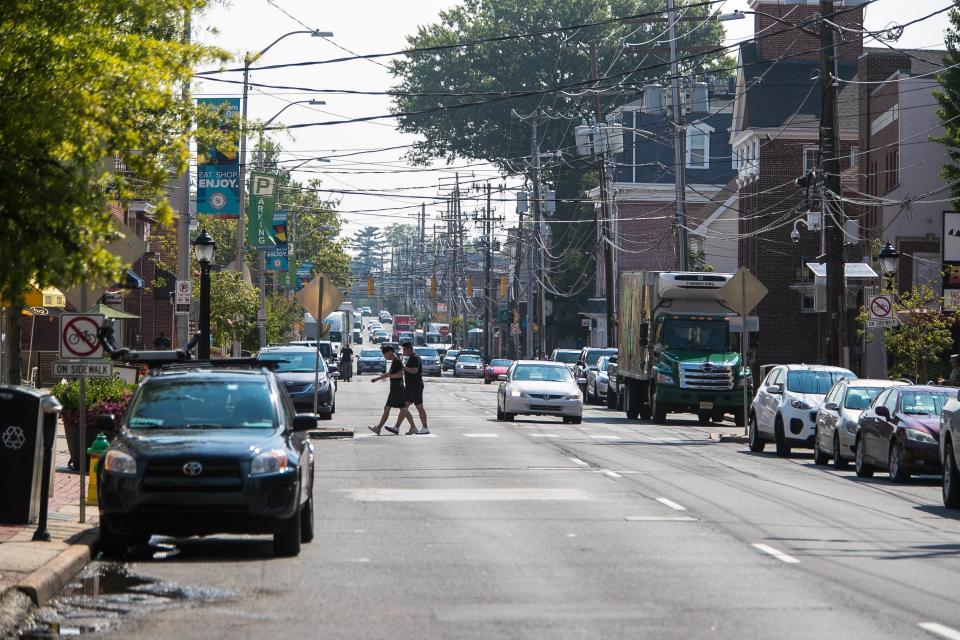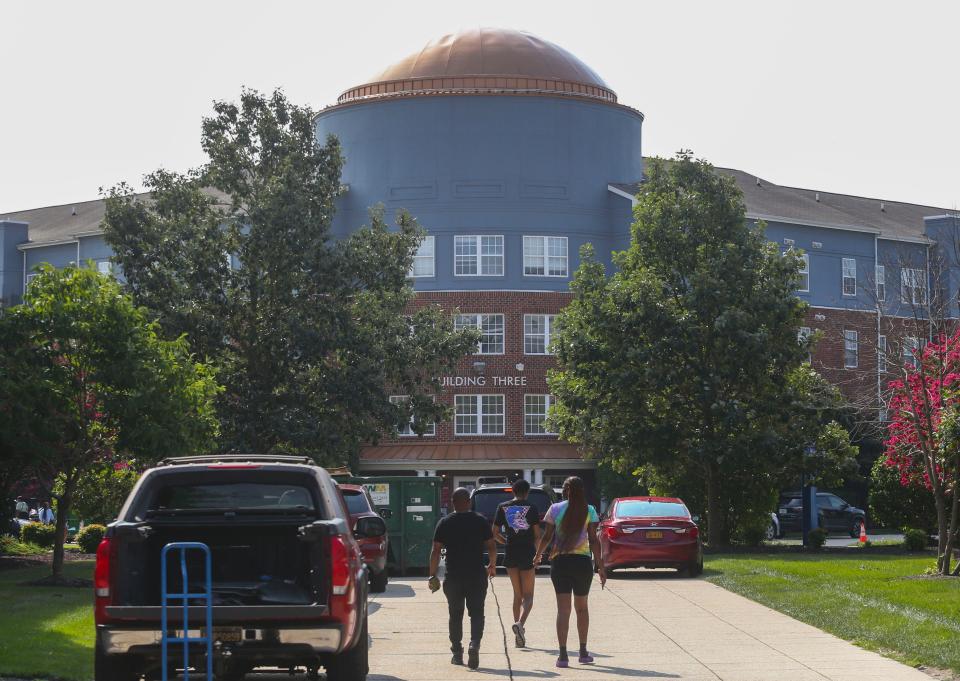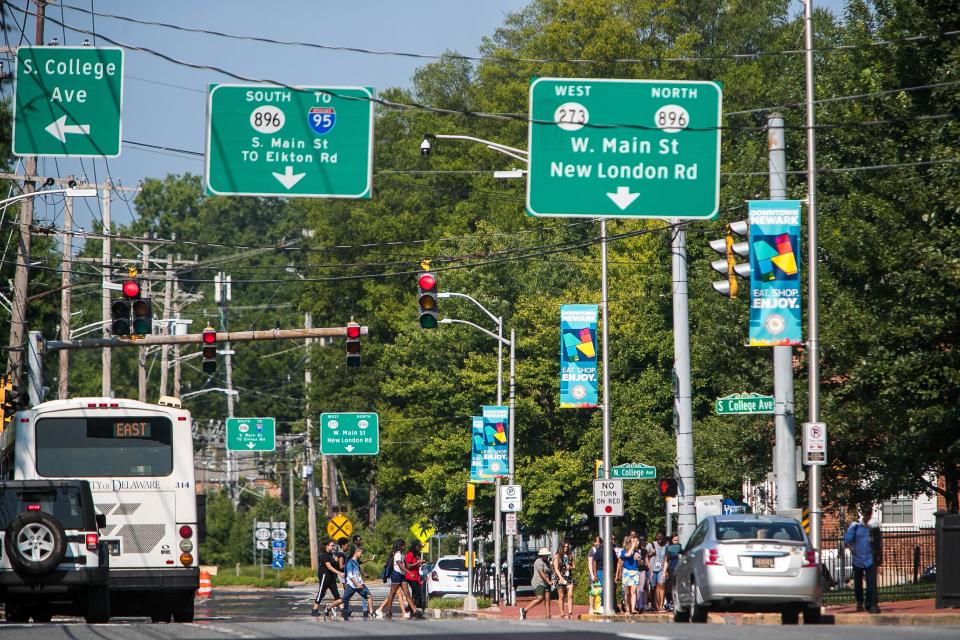Campus crime is spiking to pre-pandemic levels. University of Delaware tells similar story
Students returned to campus, and it appears crime came along with them.
Federal data shows crimes reported by university and college campuses across the nation rebounded to pre-pandemic levels by 2022, according the latest government data and a new USA TODAY database.
Crime reported from nearly 6,000 institutions rose about 8% from 2019, even though enrollments dipped in the same timeframe. The jump in offenses between 2019 and 2022 coincided with students’ post-pandemic return en masse to campuses. Compared with year-over-year changes before 2019, as reported by USA TODAY, the recent spike represents the largest increase since post-secondary institutions that receive federal funding began reporting campus safety statistics.
Delaware's largest university tells a similar story.
Data reported by the University of Delaware reveals criminal offenses in 2022 just over doubled those of 2019. That's moving from 28 crimes reported, to 59 on Newark's main campus. Aggravated assault and sexual assault were the highest drivers at 20 and 15 reports, respectively, exceeding both pre-pandemic figures and totals reported each year since 2014. Reported rapes show 10 more incidents from 2021 to 2022.
The university said: "As always, campus safety remains a proactive and top priority."

A spokesperson said evolving legal definitions on criminal activity have contributed to some increases over the years, alongside the ongoing development of campus safety practices. University of Delaware Police Department is home to one of the nation's six 911 campus call centers with advanced accreditation, according to UD, and is staffed 24 hours a day. This joins other tools and initiatives.
Burglaries reported at UD have dropped 70% overall since 2014, though just two incidents fewer than 2019 figures. Motor vehicle theft — among the highest spikes nationally — remained at just two reports in 2022. In data provided by the university, Part I crimes, defined by Delaware code as the most serious crimes, have decreased on UD’s Newark campus by 54% since 2010 and by 9% from 2022 to 2023.
"It’s also important to note that increasing momentum in crime reports is a positive reflection of efforts to encourage reporting activity by our students," the university said in a statement. "We take transparency and awareness among our community very seriously as core behavioral influencers for progress to achieve a safer campus."

[Check out USA TODAY's Crimes on Campus tool for detailed information. Zoom in on the map below to search crimes on more than 10,000 college and university campuses.]
Delaware State University sees a drop in crime
In Dover, Delaware State University reported half as many crimes in 2022 compared to 2019. Aggravated assaults were down, robbery down, motor vehicle theft at zero for main campus. Only, of those 17 incidents, nine were reports of rape.
The state's only HBCU was brought to the spotlight by students at the top of last year for concerns with campus safety, particularly sexual assaults, and this has led to further updates across campus. The Dover institution is about one-fourth of the size of UD. Other colleges in the state are smaller yet, many with incomplete datasets in this USA TODAY database.
"I hesitate to plant any flags relative to success, just because of the nature of this issue across the country," President Tony Allen said one year after protests had rocked campus. "Anybody who does that, I don't think is being realistic as to what it takes to not only talk about this out loud — but to do it boldly and make it a part of our cultural shift."
Nationally, that overall shift is tipping up.
Flashback in Dover: Where is Delaware State one year after calls for improved safety, handling of sexual assault?
Breaking down national issues
Experts see little reason to worry. The numbers are largely consistent with what colleges have been experiencing since 2013, according to S. Daniel Carter, president of the consulting firm Safety Advisors for Educational Campuses.
Following a steady decline starting around 2006, the number of crimes reported by colleges and universities remained pretty stagnant over the last decade, according to government data. Yet when foot traffic on and around campuses diminished in 2020 after classes went online during the pandemic, crime dropped precipitously in 2020. In the years since it has inched up again.
In national figures, the recent increase was mostly driven by a surge in reported motor vehicle theft, which more than doubled from 2019 and accounted for more than a quarter of offenses in 2022. Carter was skeptical of that spike, saying it could be traced to schools changing their reporting requirements to comply with federal law.
“There has been some work done to increase awareness that scooters and golf carts are motor vehicles – that could be a factor,” he said.

Government data is not yet available for 2023, so these numbers don’t account for the turmoil on college campuses in the wake of the Israel-Hamas war. Recent surveys show many Muslim and Jewish students reported feeling unsafe on campus since the Oct. 7 attacks, which prompted massive campus clashes and protests, as well as spikes in Islamophobic and antisemitic incidents.
The reported numbers from 2022 include offenses that occurred on and off campus, including on university properties located elsewhere; offenses that occurred on public property adjacent to campuses, and a small number of offenses reported to institutions by local police.
Renewed push to encourage students to report crimes

Colleges and universities that receive federal funding must compile statistics about crimes that occur on or near campus under the Clery Act. The federal law, passed in 1990, was named after 20-year-old Jeanne Clery, a student whose rape and murder at her dorm at Lehigh University drew national attention.
The tension colleges contend with in simultaneously trying to encourage students to report crimes and keep numbers down was on full display during a recent scandal at Liberty University, a private Evangelical university in Virginia.
The federal government concluded last year that the school created a culture of dissuading victims of sexual assault from reporting what happened to them, according to a preliminary report obtained by USA TODAY. Then, in March, the Education Department slapped the school with a $14 million fine and ordered officials to pay another $2 million for “on-campus safety improvements and compliance enhancements.” In a written statement in March, Dondi E. Costin, Liberty’s president, said the school sincerely regretted the errors.
Clery Act figures are self-reported, and the Department of Education doesn’t verify them independently. However, the agency conducts periodic reviews of Clery Act compliance. Over the past 15 years, the agency has evaluated at least 110 universities. Dozens of those cases have led to fines.
The Liberty scandal shed light on the consequences schools face if they don’t fully comply with the law, said Abigail Boyer, the associate executive director of the Clery Center, which tracks campus safety trends.
As she put it: “Ultimately, we want campuses to create a culture in which students are comfortable about reporting."
This article originally appeared on USA TODAY: Campus crime is spiking. University of Delaware tells a similar story